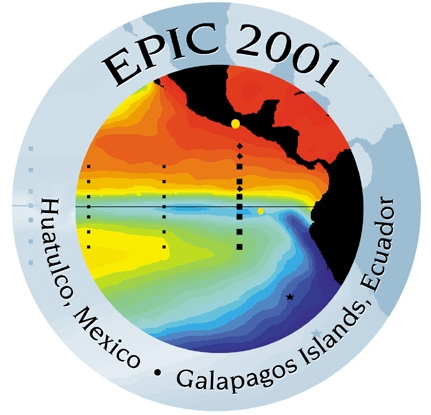EPIC FIELD OPERATIONS PLAN
Huatulco, Mexico and San Cristobal Island, Galapagos, Ecuador
1 September — 15 October, 2001

EPIC FIELD OPERATIONS PLAN
Huatulco, Mexico and San Cristobal Island, Galapagos, Ecuador
1 September — 15 October, 2001

Section 1: Field Operations Overview
1.1 Introduction
EPIC, a multinational cooperative experiment in the eastern Pacific Ocean, is sponsored by the National Science Foundation (NSF) and the National Oceanic and Atmospheric Administration (NOAA), USA; the National Council on Science and Technology (CONACyT), Mexico; and the cooperation of the National Institute of Hydrology and Meteorology (INAMHI), Ecuador.
1.2 Operations Overview
The research aircraft C-130 and WP-3D of NSF and
NOAA, respectively, will operate fron Huatulco, Mexico. The research ships
Ron
Brown (NOAA) and El Puma (UNAM), as well as the New
Horizon (UNOLS) will participate in the six-week intensive observations
period. In addition, Aerosonde Robotic Aircraft will be flown from San
Cristobal Island, Galapagos. The area of operations will be SW of Huatulco
along 95W to the equator and along a line from the equator and 95W to 20S
and 85W.
1.3 Deployment Base; Duration
The primary base of operations for the field phase of EPIC will be Huatulco, Mexico with a secondary base of operations located on San Cristobal Island, Galapagos, Ecuador.
The intensive period of observations will begin on
1 September and end on 15 October, 2001.
2. EPIC2001 Science Working Group
2.1 Functions and Responsibilities
The EPIC2001 Science Working Group has the responsibility to ensure that all EPIC scientific objectives are met. The EPIC SWG, therefore, will be responsible for the overall guidance of the daily research activities, especially the specification of the scientific objectives for all research aircraft missions and the necessary coordination with the research ships and Aerosonde operations.
The decisions of the SWG pertaining to the aircraft missions will be binding to all participating scientists, the Field Operations Director and his staff.
2.2 Coordination During Field Operations
Nearly all decisions made by the SWG will be made during the Daily Planning Meeting. The Field Operations Director and his staff will execute these decisions and assist all participating scientists in securing all they require to carry out their field activities to the extent that changing conditions and safety considerations permit.
2.3 The Daily Planning Meetings: Mission Selection Process
All scientific decisions for EPIC will be made by the EPIC SWG which is responsible for the overall guidance of the field program and the accomplishment of the scientific objectives.
The Field Operations Director will chair the daily meetings and will have the responsibility of providing to the SWG status reports of the operations to-date, forecast and satellite products deemed necessary by the SWG.
The SWG daily meeting will begin at xxxx hours LT each day during the intensive observations period. A daily operations report will be prepared by the Field Operations Director and his staff in consultation with the SWG.
2.4 The EPIC Data Catalog
UCAR Joint Office for Science Support (JOSS) has developed the capability of maintaining a World Wide Web (WWW)-based field data catalog. The on-line catalog capability allows investigators limited perusal and display of preliminary data products during the field phase. The catalog will also provide in-field documentation of project activities (daily or otherwise as required) and summarize data collection. The field data catalog will provide access to daily operations summaries at the Huatulco Operations Center, as well as from the Ron Brown and the San Cristobal Center activities. The EPIC field catalog can be reached at http://www.joss.ucar.edu/epic/catalog/.
3. EPIC2001 Field Operations Center
The primary function of the Field Operations Center is to support the activities of the SWG and other participating scientists in meeting the scientific objectives of EPIC. To accomplish the required tasks, the Field Operations Center will conduct daily meetings, at a time specified by the SWG, to review the present and extended forecasts, monitor all aspects of the experiment, facilitate the coordination of the activities of the participants, ensure adequate communications among the SWG and research platforms, including Galapagos, and maintain a data catalog during the field phase.
3.1 Facilities and Staff
The venue of the Field Operations Center will be at the Magnihotel, Bahias de Huatulco, Mexico. For Aerosonde operations the deployment base will be located at the meteorological station on San Cristobal Island, Galapagos, Ecuador.
The Huatulco Field Operations Center will support
the activities of the participants by providing a local area network (LAN);
an area for meetings and forecast discussions and the daily mission selection
process; the JOSS satellite system; and an area for the Field Operations
Director and his staff for operational and logistical support.
3.2 Telephone Numbers
Fax: 958-10188
Operations Director: 958-77730
Logistics: 958-77731
San Cristobal Operations Center:
RADIOSONDA Station: Voice / Fax: 593-5-520-340
C. Other Numbers: